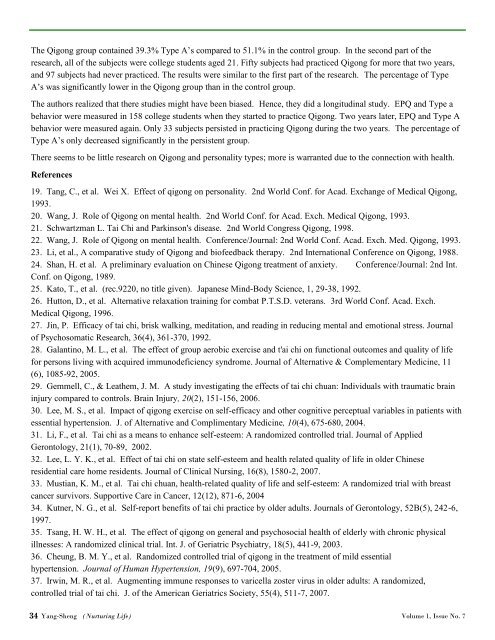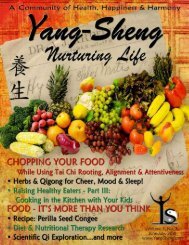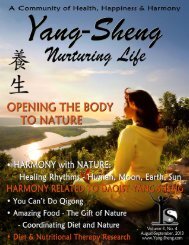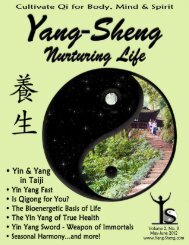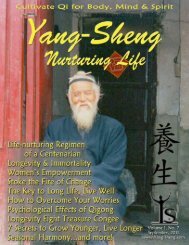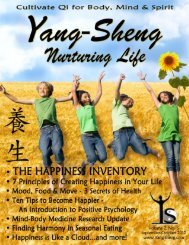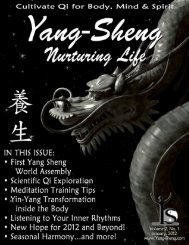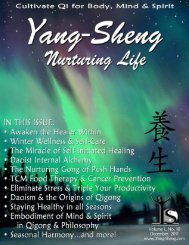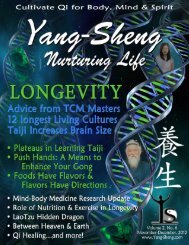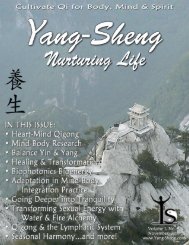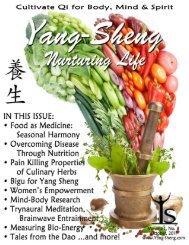Click to download the entire September issue as a PDF - Yang-Sheng
Click to download the entire September issue as a PDF - Yang-Sheng
Click to download the entire September issue as a PDF - Yang-Sheng
Create successful ePaper yourself
Turn your PDF publications into a flip-book with our unique Google optimized e-Paper software.
The Qigong group contained 39.3% Type A’s compared <strong>to</strong> 51.1% in <strong>the</strong> control group. In <strong>the</strong> second part of <strong>the</strong><br />
research, all of <strong>the</strong> subjects were college students aged 21. Fifty subjects had practiced Qigong for more that two years,<br />
and 97 subjects had never practiced. The results were similar <strong>to</strong> <strong>the</strong> first part of <strong>the</strong> research. The percentage of Type<br />
A’s w<strong>as</strong> significantly lower in <strong>the</strong> Qigong group than in <strong>the</strong> control group.<br />
The authors realized that <strong>the</strong>re studies might have been bi<strong>as</strong>ed. Hence, <strong>the</strong>y did a longitudinal study. EPQ and Type a<br />
behavior were me<strong>as</strong>ured in 158 college students when <strong>the</strong>y started <strong>to</strong> practice Qigong. Two years later, EPQ and Type A<br />
behavior were me<strong>as</strong>ured again. Only 33 subjects persisted in practicing Qigong during <strong>the</strong> two years. The percentage of<br />
Type A’s only decre<strong>as</strong>ed significantly in <strong>the</strong> persistent group.<br />
There seems <strong>to</strong> be little research on Qigong and personality types; more is warranted due <strong>to</strong> <strong>the</strong> connection with health.<br />
References<br />
19. Tang, C., et al. Wei X. Effect of qigong on personality. 2nd World Conf. for Acad. Exchange of Medical Qigong,<br />
1993.<br />
20. Wang, J. Role of Qigong on mental health. 2nd World Conf. for Acad. Exch. Medical Qigong, 1993.<br />
21. Schwartzman L. Tai Chi and Parkinson's dise<strong>as</strong>e. 2nd World Congress Qigong, 1998.<br />
22. Wang, J. Role of Qigong on mental health. Conference/Journal: 2nd World Conf. Acad. Exch. Med. Qigong, 1993.<br />
23. Li, et al., A comparative study of Qigong and biofeedback <strong>the</strong>rapy. 2nd International Conference on Qigong, 1988.<br />
24. Shan, H. et al. A preliminary evaluation on Chinese Qigong treatment of anxiety. Conference/Journal: 2nd Int.<br />
Conf. on Qigong, 1989.<br />
25. Ka<strong>to</strong>, T., et al. (rec.9220, no title given). Japanese Mind-Body Science, 1, 29-38, 1992.<br />
26. Hut<strong>to</strong>n, D., et al. Alternative relaxation training for combat P.T.S.D. veterans. 3rd World Conf. Acad. Exch.<br />
Medical Qigong, 1996.<br />
27. Jin, P. Efficacy of tai chi, brisk walking, meditation, and reading in reducing mental and emotional stress. Journal<br />
of Psychosomatic Research, 36(4), 361-370, 1992.<br />
28. Galantino, M. L., et al. The effect of group aerobic exercise and t'ai chi on functional outcomes and quality of life<br />
for persons living with acquired immunodeficiency syndrome. Journal of Alternative & Complementary Medicine, 11<br />
(6), 1085-92, 2005.<br />
29. Gemmell, C., & Lea<strong>the</strong>m, J. M. A study investigating <strong>the</strong> effects of tai chi chuan: Individuals with traumatic brain<br />
injury compared <strong>to</strong> controls. Brain Injury, 20(2), 151-156, 2006.<br />
30. Lee, M. S., et al. Impact of qigong exercise on self-efficacy and o<strong>the</strong>r cognitive perceptual variables in patients with<br />
essential hypertension. J. of Alternative and Complimentary Medicine, 10(4), 675-680, 2004.<br />
31. Li, F., et al. Tai chi <strong>as</strong> a means <strong>to</strong> enhance self-esteem: A randomized controlled trial. Journal of Applied<br />
Geron<strong>to</strong>logy, 21(1), 70-89, 2002.<br />
32. Lee, L. Y. K., et al. Effect of tai chi on state self-esteem and health related quality of life in older Chinese<br />
residential care home residents. Journal of Clinical Nursing, 16(8), 1580-2, 2007.<br />
33. Mustian, K. M., et al. Tai chi chuan, health-related quality of life and self-esteem: A randomized trial with bre<strong>as</strong>t<br />
cancer survivors. Supportive Care in Cancer, 12(12), 871-6, 2004<br />
34. Kutner, N. G., et al. Self-report benefits of tai chi practice by older adults. Journals of Geron<strong>to</strong>logy, 52B(5), 242-6,<br />
1997.<br />
35. Tsang, H. W. H., et al. The effect of qigong on general and psychosocial health of elderly with chronic physical<br />
illnesses: A randomized clinical trial. Int. J. of Geriatric Psychiatry, 18(5), 441-9, 2003.<br />
36. Cheung, B. M. Y., et al. Randomized controlled trial of qigong in <strong>the</strong> treatment of mild essential<br />
hypertension. Journal of Human Hypertension, 19(9), 697-704, 2005.<br />
37. Irwin, M. R., et al. Augmenting immune responses <strong>to</strong> varicella zoster virus in older adults: A randomized,<br />
controlled trial of tai chi. J. of <strong>the</strong> American Geriatrics Society, 55(4), 511-7, 2007.<br />
34 <strong>Yang</strong>-<strong>Sheng</strong> (Nurturing Life) Volume 1, Issue No. 7


